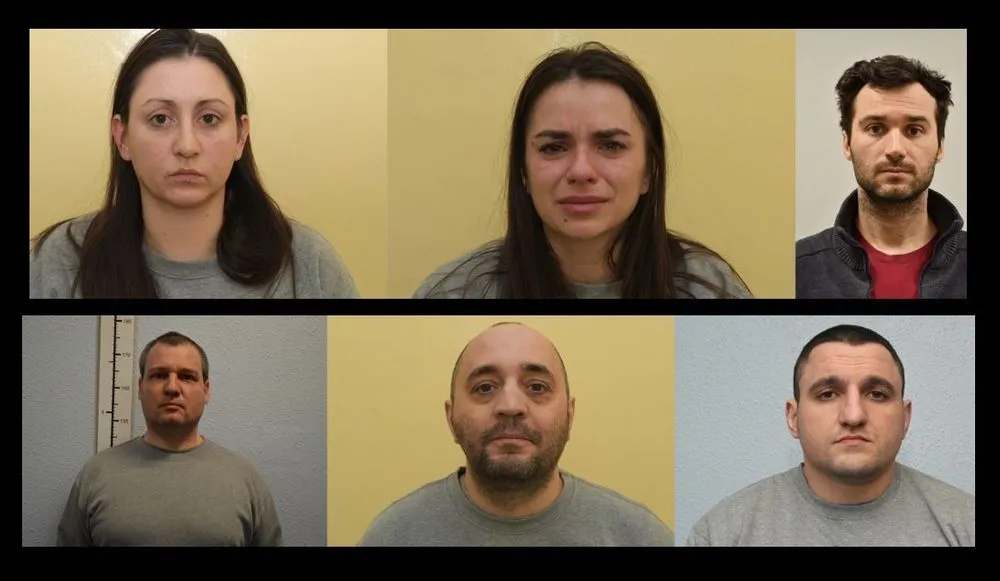Russia’s ‘outsourced’ Bulgarian spy ring sentenced to more than 50 years in UK
Six members of an “outsourced” spy ring operating in Britain on behalf of the Kremlin were sentenced to a combined 50 years in prison on Monday for activities they’d engaged in under the direction of the Russian state.
The sentences are the most significant to be handed down in recent years to proxies used by Russia’s intelligence services, a practice the Kremlin is believed to have doubled-down on following widespread disruption to its traditional intelligence activities in Europe after many of its spies with diplomatic cover were expelled from host nations following the invasion of Ukraine.
“This case is a clear example of the increasing amount of state threat casework we are dealing with in the UK. It also highlights a relatively new phenomenon whereby espionage is being ‘outsourced’ by certain states,” said Dominic Murphy, the head of the Metropolitan Police Service’s counter terrorism command, which is responsible for law enforcement activity targeting state threats in Britain.
The spies, all Bulgarian nationals, had been tasked with surveilling various targets selected by the Kremlin, including Ukrainian troops training in Germany, and were based around Roussev’s home at a guesthouse in Great Yarmouth, Norfolk.
Their operations stretched across several major European cities and included targeting fellow Bulgarian national Christo Grozev for potential kidnapping. He had provoked Moscow’s ire through his work for the investigative group Bellingcat identifying the poisoning of Russian opposition figure Alexei Navalny.
Additional operations disclosed in court included the surveilling of Roman Dobrokhtov, a Russian national and Kremlin critic; Bergey Ryskaliyev, a politician from Kazakhstan who had fled to the United Kingdom; and Kirill Kachur, a Russian national designated a "foreign agent" by the Kremlin after leaving Russia in 2023.
Another plot involved staging a fake protest at the Kazakh Embassy in London for the sake of allowing the Kremlin to feed “intelligence” on the protest to the Kazakh leadership in a bid to make a good impression.
According to the Crown Prosecution Service (CPS), the Bulgarian network was ultimately being run by Jan Marsalek, a fugitive Austrian businessman who had been the chief operating officer for Wirecard before disappearing shortly after the company announced $1.9 billion was missing from its accounts. Marsalek is believed to be hiding in Russia and is suspected of working for both Russia’s GRU military intelligence agency and the FSB.
The heaviest sentence handed down on Monday was 10 years and eight months given to the group’s ringleader, Orlin Roussev — a man who claimed to be a technology expert and to have studied at Queensland University of Technology, although a spokesperson denied anyone by that name had ever graduated from the Australian school.
Roussev’s principal deputy, Bizer Dzhambazov, was sentenced to 10 years and two months. The other members of the plot included Katrin Ivanova (nine years and eight months) and Vanya Gaberova (six years, eight months and three weeks) — both women described as “honeytraps” for the group’s targets — and Tihomir Ivanchev and Ivan Stoyanov who received eight years and five years and three weeks respectively.
The convicts will spend at least half of their sentences in prison before being eligible for parole, at which point they face being deported back to Bulgaria.
“There can be no doubt that each of the defendants knew exactly who they were spying for,” said Frank Ferguson, the head of the CPS special crime and counter terrorism division.
Murphy, the Met’s counterterrorism commander, praised the police investigation and said it had left the “ringleaders with no option but to plead guilty” despite Roussev initially denying carrying out espionage activity for Russia, before later changing his plea.
In a statement, Britain’s security minister, Dan Jarvis, said: “These substantial sentences should send a clear warning to anyone seeking to threaten our security, harm the UK, and compromise the safety of the public.
“This case is a stark reminder of the increasingly complex threat we face from hostile states who wish to undermine us. … We will use the full range of tools and powers available to us to detect, disrupt, and deter malicious acts from hostile states and protect the public,” said Javis.
“I am especially grateful for the work of our world-leading law enforcement partners and the Crown Prosecution Service for disrupting this threat and bringing these individuals to justice.”
Alexander Martin
is the UK Editor for Recorded Future News. He was previously a technology reporter for Sky News and a fellow at the European Cyber Conflict Research Initiative, now Virtual Routes. He can be reached securely using Signal on: AlexanderMartin.79



